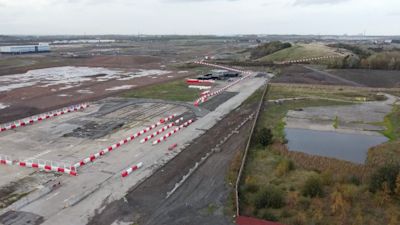Britishvolt: what happened - and what's next for the Northumberland site?

Britishvolt has collapsed into administration, dashing plans for a multibillion-pound factory in Northumberland.
The factory was supposed to bring thousands of jobs to the area as the company had been promising to build a new gigafactory, producing batteries for electric cars.
Most of the 300 staff at the company have been made redundant after talks to save the firm collapsed.
What is a gigafactory?
As the world transitions from petrol and diesel cars to electric, it needs millions of batteries to power them.
The word 'gigafactory' itself was coined by electric car maker Tesla to describe a massive factory which manufactures batteries.
According to the Faraday Institution, a research institute in Oxfordshire, the UK will need 10 gigafactories by 2040, which could support 270,000 jobs.
What were Britishvolt's plans?
The firm had hoped to open the first gigafactory in the UK and selected a site in Cambois - a former coal mining village near Blyth.
It became the poster child of the government's levelling up agenda, with ministers plans for 3,000 jobs in the region and the investment they would bring.
Britishvolt's plans were also grand - the factory was set to be the UK's fourth-largest building and one of the top 20 in the world.
Who was behind Britishvolt?
The company's name was an apparent nod to Northvolt - a Swedish start-up which has successfully set up a battery factory in the country.
However, unlike Northvolt's former Tesla executive founder, Britishvolt's founders had much less experience.
Swedish Lars Carlstrom left the business in December 2020 after a historical tax fraud conviction was discovered.
How far did it get?
The plans never got very far.
The business managed to buy the site of a former power plant in Cambois in April 2021 and received planning permission for the factory.
Images from the site show that the company broke ground and put up fencing around the area. But it did not get very far before work had to be paused in August last year.
Why did it fail?
Quite simply, Britishvolt could not raise enough cash to keep going. The company had been promised £100m in government funding.
But this was only available if the company met certain milestones, which it never did.
In recent months the business has tried to find enough cash from private investors to stay above water, but failed.
What happens next?
For the company itself, it's over.
Administrators at consultancy EY will try to sell off the intellectual and physical property Britishvolt owns and raise as much money to pay off its debts.
EY said the future of the site, bought for £4.8m, would depend on whether others are interested in buying the land.
What will it mean for the local community?
As aforementioned, most of the company's 300 people have already lost their jobs.
In the long term, the site may open up to a developer which is able to raise enough cash to go ahead with the investment, which could also benefit the area and the British car industry.
Want a quick and expert briefing on the biggest news stories? Listen to our latest podcasts to find out What You Need To know...